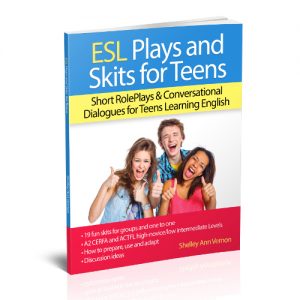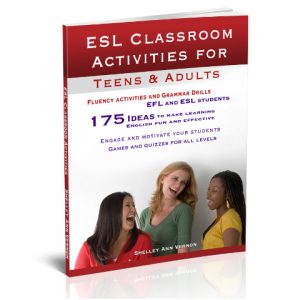Adverb games are the best way to help your students learn while making your lesson memorable. Firstly, of course, you need to explain what an adverb is.
What is an adverb?
In short, an adverb “adds” information about what it describes. So, a verb explains what is done while an adverb of manner describes how something is done. There are several adverb forms, such as those of time, manner, frequency, quantity, and place, plus adverbs that describe adjectives. The adverb games below use adverbs for how something is done. These common ones could be a good place to start; quickly or fast, slowly, loudly, quietly, carefully, well, badly, beautifully, happily, and sadly.
A 5-minute game – introducing adverbs
Let’s get started with an adverb game to introduce the concept. First, demonstrate some actions and adverbs and then have the class do them as follows: Have the class mime a verb such as I am brushing my teeth. While everyone is doing this, say, “quickly!” Next mime it yourself to demonstrate and have students speed up while you repeat, “quickly, brush your teeth quickly.” Then say, “Brush your teeth slowly, slowly,” while you mime it for them. As always, scan and observe your students as they mime for feedback on whether they understand. Now continue with other adverbs like happily and sleepily. If you follow a syllabus, work with the adverbs in the index to be on target with the course. That way, you can satisfy your boss!
Many adverb games follow below, and if you want an amazing collection of classroom, online or one-to-one games, please see my four relevant games books. You can get them in paperback and Kindle from Amazon or PDF download from me. (The ESL online games book is only on Amazon.)
10-minute adverb games – practising
For this activity, give the class five verbs and have them write down five adverbs, one for each verb. First, ask some students to mime their verb while the others guess what verb it is. Once the action is identified, students act it in the style of the adverb. Next, make teams and have students race to guess the adverb. Now, or in a later lesson, repeat this activity in small groups. Once you see a pair or group working fluidly, give them some more adverbs to try.
This next classroom game will allow you to observe how students are progressing. Firstly, put the class into teams and play a game with a group at the front miming a verb you give them secretly. Then have students freeze when you say so. Now teams race to guess what they were doing for one point and how they were doing it for two points. If students stall, have those at the front resume miming to prompt more ideas.
Tips: Don’t add any more verbs since the focus is on adverbs. Encourage good behaviour from younger students by deducting a point from their team for naughtiness.
Adverb writing & speaking game
This 5-minute brainstorming game is excellent for revision. So start by brainstorming adverbs and have students copy them down with the translation. A homework task is to learn ten of these.
Leaving the adverb list on the board, pick one and use it in a sentence, such as She ate quickly. Then ask the class, how did she eat? Get everyone to repeat together « quickly! » He was walking slowly. How was he walking? Signal for everyone to call in unison ,« slowly! » Keep the pace moving, flowing through all the adverbs quickly. This speaking drill will be boring if you hesitate and don’t come up with sentences fluidly.
Tips: A bit of class repetition in unison gives everyone a chance to say all the adverbs, and it helps shy students join in, who otherwise might not make a sound all lesson.
Mixed ability class: Have your two best students think of sentences with you up front. Or have your best student and a hyperactive one mime sentences as you go through the list. However, don’t let this drag, but keep moving through the adverbs.
Speaking drill – Fill in Drill – 5 minutes
Fill in Drill is excellent to help students memorize vocabulary or grammar. Write a passage on the board that contains lots of adverbs. If you have a textbook, copy an excerpt from that. The unit on adverbs will have plenty. Otherwise, take any story you know, like Little Red Riding Hood, and tell it with adverbs. So, every time there is a verb, include an adverb, although this can be more time-consuming than you might think! Therefore, it could be an excellent homework task for students. Play Fill in Drill and rub out the adverbs only as you go along until you have rubbed them all out.
Examples:
Little Red Riding Hood walked happily through the forest. She carried a basket of strawberries carefully. Finally, she arrived at her grandmother’s house and knocked loudly on the door.
For teens :
Phil unexpectedly came round the corner, and Susy blushed shyly. She had a mega crush on Phil. Phil looked directly at her, and she ignored him completely while she busily put her books in her locker. Suddenly Phil was at her side. She couldn’t ignore him now…her heart beat faster, and her breath was shallower. She nearly fainted; she had THAT much of a crush on him!
Reading and writing task – 10 minutes
Give students the task of adding adverbs to a text. For mixed ability classes, better students can continue the story, while average ones can add adverbs and finish sentences. The lower-level students stick to adding adverbs. Here is an example text. Higher-level students add a sentence that contains at least one adverb. It’s also good to have students working in pairs.
It was dark and he walked (ADVERB) _. He was (ADJECTIVE). At the end of the street, he looked up (ADVERB) and saw (NOUN or PRONOUN) . (It/they/he/she) was/were (VERB) (ADVERB) _____ and (ADVERB)_.
You might get a sentence like this: It was dark, and he walked quickly. He was happy. At the end of the street, he looked up suddenly and saw an owl. It was flying silently and majestically.
Poems
Use poems as inspirational or beautiful texts for adverb games rather than working with boring everyday sentences.
For example, take this beautiful poem by James Reeves, describing the wind. Task: for each line, students choose an adjective to describe best how the wind is acting on the environment. This activity could be a pairwork task, and it’s a good idea to allow dictionaries. Make this a team game by counting how many original adverbs each team has. Alternatively, you could give students a list of adverbs and have them attribute each to a line in the poem.
I can get through a doorway without any key
And strip the leaves from the great oak tree
I can drive storm-clouds and shake tall towers,
Or steal through a garden and not wake the flowers.
Seas I can move and ships I can sink;
I can carry a house-top or the scent of a pink.
When I am angry I can rave and riot;
and when I am spent, I lie quiet as quiet.
Suggested adverbs to choose from are: dishonestly, cunningly, greedily, powerfully, stealthily, cruelly, violently, mightily, gently, angrily, crazily, quietly, silently, calmly, and peacefully.
You will find games to use with poems in both these books: ESL Activities for Teens and Adults and ESL Online Games.
Another game
Once students have shared some examples, you could play Charades in teams. Team A act one of the sentences and team B guess the missing words. Do this against the clock with a time limit. Give points for each word. Then, team C and D have a turn. Having the actors and guessers on the same team means they work together. Otherwise, some students might deliberately act badly or not at all so as not to help the “competition” win points!
Resource for teaching adverbs to teens
My skits book for teens has three plays that focus on adverbs.
Cooking Adverbs of quantity, Uncountables, How much / many?
Jealousy Adverbial phrases of frequency, Past Simple, Questions
Know-all Adverbs of time, Imperatives
You can find out more about my skits for teens here. And here you can read a sample skit.
Adverb games for revision
Have students play an easy variant of adverbs scrabble. You don’t need scrabble letters because any adverb the student thinks of is accepted.
Show the class how to play first with an example. Bring up two students to the front. Write an adverb on the board, like silently. Another student must think of an adverb and add it. You don’t need scrabble letters, any adverb the student can think of is accepted. Once the demo is done, let students play in groups of four, but working as two pairs, not four individuals, to avoid someone stalling with no ideas. Examples :
Game tips: Don’t allow textbooks or dictionaries for the first round. After 5 minutes, stop the game and ask students to count how many adverbs they added. You might have pairs swap charts and check each other’s spelling using a dictionary for accuracy.
Now play again, but this time students may use their books and list of adverbs. This time, it’s a race for each group to get as many down as possible in 3 minutes.
Three great resources for adverb games
-
Sale Product on sale
 Plays and Skits for Teens
Plays and Skits for Teens£19.97Original price was: £19.97.£15.33Current price is: £15.33.Rated 5.00 out of 5 based on 1 customer rating -
Sale Product on sale
 Games and Activities for Teens and Adults
Games and Activities for Teens and Adults£19.97Original price was: £19.97.£15.33Current price is: £15.33.Rated 5.00 out of 5 based on 12 customer ratings -
 ESL Online Games£19.97Rated 5.00 out of 5 based on 4 customer ratings
ESL Online Games£19.97Rated 5.00 out of 5 based on 4 customer ratings



